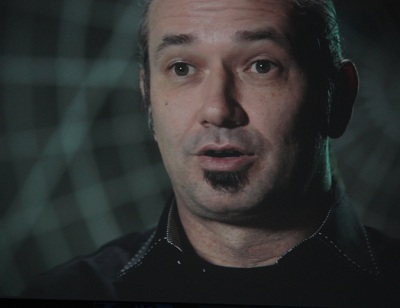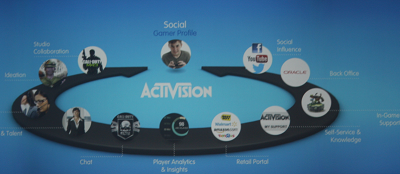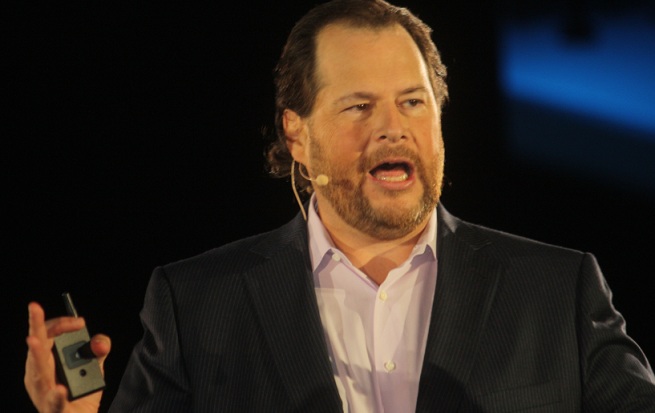SAN FRANCISCO — Salesforce.com chief executive Marc Benioff related a bunch of stories to illustrate how social media is changing the enterprise. To do so, he talked about how his company has transformed the social support infrastructure at Activision Blizzard, the publisher of the Call of Duty games and a company with $4.8 billion in annual sales.
 The story was one of many that Benioff and his team discussed in the keynote speech at Dreamforce 2012, Salesforce’s San Francisco conference which draws up to 90,000 people.
The story was one of many that Benioff and his team discussed in the keynote speech at Dreamforce 2012, Salesforce’s San Francisco conference which draws up to 90,000 people.
Activision has to be vigilant about customer support in the age of social media, since the online world can magnify one person’s problem by millions. Fergus Griffin, the senior vice president of marketing at Salesforce.com, and Robert Schmid (pictured right), the chief information officer at Activision, showed what happens when a support-oriented tweet goes out.
In the case, they noted that a guitar performer Paul Woods tweeted that he couldn’t get his G45 guitar to work in a Guitar Hero game. That tweet comes up in the feed for tweets that are viewed by hundreds of support professionals at Activision, which has 7,700 employees. They see the tweet amid a ton of communications coming into an app called Chatter Communities for Partners within Salesforce.com’s Service Cloud offering.
The app’s dashboard lets employees see all of the actionable support communications coming in from fans. At a glance, the employees can see what issues they have addressed and what is still coming in via phone, Twitter, Facebook, web chat, the customer support email, and web site help desks.
“We’re enabling a social enterprise,” Schmid said. “We’re interacting with people the way they want to interact. It’s a faster, better way of doing things. ”
With the app, you can share information among groups such as developers, PR, marketers, and support specialists. Anyone can search through the company’s records to do research on a question.
Salesforce.com customers say that the Service Cloud increases customer satisfaction by 34 percent. The Salesforce.com app becomes a “social front office for customers.”
The service brings in and organizes data in a way that the company can analyze the experience of customers and draw broad conclusions about it that could help millions of players. Employees can escalate critical problems to get more support from the entire company. In the near future, the employees will be able to handle the support through the Service Cloud via mobile devices.
Schmid said that the flattening of social communications is spurring a cultural change within a company. Schmid asked the group a question but found no one answered. He asked an employee why she didn’t respond to him, and she said that her boss or her boss’s boss hadn’t responded yet.
“That shows a need for cultural change,” Schmid said.
Afterward, Schmid mentioned that his company will use Salesforce.com to do more self-service support for gamers, where players can advise each other on how to fix their technical issues. Some of that exists now, but more will happen in the future.
 In the case of Woods, Activision found an answer quickly and communicated back to him via Twitter.
In the case of Woods, Activision found an answer quickly and communicated back to him via Twitter.
![]() CloudBeat 2012 will assemble the biggest names in the cloud’s evolving story to learn about real cases of revolutionary cloud adoption. Unlike other cloud events, customers — the users of cloud technologies — will be front and center. Their discussions with vendors and other experts will give you rare insights into what really works, who’s buying what, and where the industry is going. CloudBeat happens November 28-29 in Redwood City, Calif. Register today!
CloudBeat 2012 will assemble the biggest names in the cloud’s evolving story to learn about real cases of revolutionary cloud adoption. Unlike other cloud events, customers — the users of cloud technologies — will be front and center. Their discussions with vendors and other experts will give you rare insights into what really works, who’s buying what, and where the industry is going. CloudBeat happens November 28-29 in Redwood City, Calif. Register today!
VentureBeat's mission is to be a digital town square for technical decision-makers to gain knowledge about transformative enterprise technology and transact. Learn More

